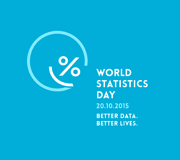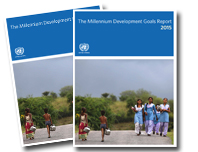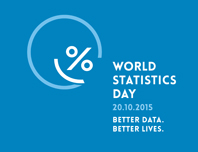
Better data for better lives: Statistics at the center of sustainable development
As the global statistical community embarks on the final phase of defining a new indicator framework to review progress of the newly adopted 2030 Agenda for Sustainable Development, the world community prepares to celebrate World Statistics Day on 20 October.
This day was proclaimed by the United Nations General Assembly in 2010 to recognize the central role of statistics for development and their importance in shaping our societies. A statistical day was already a tradition in over 100 countries around the world, but the adoption by the General Assembly of a resolution marking 20 October as World Statistics Day brought a strong recognition of the important role of statistics in people’s lives.
The first World Statistics Day was commemorated on 20 October 2010. Five years later, the celebration is taking place at a crucial moment for the statistical community. The Millennium Development Goals (MDGs), which raised the political relevance of statistics, draw to a close at the end of this year, and world leaders have adopted a new agenda that will guide efforts to ensure sustainable development for all.
The MDG monitoring experience
 The experience of monitoring the MDGs has taught very important lessons and demonstrated the centrality of statistics to development. Monitoring has helped keep the focus on policy priorities, informed the global political debate and helped advocacy and communication with the public. In turn, this has raised awareness on the need to constantly improve consistency and harmonization of indicator production and utilization and for building statistical capacity.
The experience of monitoring the MDGs has taught very important lessons and demonstrated the centrality of statistics to development. Monitoring has helped keep the focus on policy priorities, informed the global political debate and helped advocacy and communication with the public. In turn, this has raised awareness on the need to constantly improve consistency and harmonization of indicator production and utilization and for building statistical capacity.
MDG monitoring has also shown what effective inter-agency collaboration can achieve. Over a period of almost fifteen years, over thirty international agencies within and beyond the UN system, worked effectively together to produce a yearly report on MDG progress, oversee methodological developments on the indicators, and ensure that the best and most up-to-date data on the goals and targets were made available to policy makers and to the public.
The Inter-agency and Expert Group (IAEG) on MDG Indicators gained recognition from many parts of the international community as a unique mechanism for collaboration across agencies and national statistical systems. Moreover, as the number of experts from national statistical systems became part of the group, they brought their national experiences, needs and priorities to the discussion, and made important recommendations to the UN Statistical Commission for follow-up in areas of capacity and methodological development.
The IAEG on MDG Indicators also became an important coordination mechanism to review and address inconsistencies between national and global monitoring, exposing the underlying reasons for differences between international and national data sets and advising on strategies to resolve them.
Indicators for the 2030 Agenda for Sustainable Development
The review of progress towards the goals and targets set by the new development agenda adopted on 25 September, will require an even greater level of collaboration and coordination across countries and international agencies. The number of policy areas addressed by the agenda is significantly larger and the scope of the indicators will require the involvement of the whole statistical system in every country.
Building on the experience and lessons learnt over the last fifteen years, last March the United Nations Statistical Commission created at its 46th session the Inter-agency and Expert Group on SDG Indicators (IAEG-SDGs), which will operate similarly to the IAEG on MDG Indicators. One important new aspect is that the IAEG-SDGs will be country-led, ensuring full country ownership in the implementation of the monitoring programmes.
Twenty-eight Member States are represented in the group by their national statistical experts. These experts will work closely with representatives of international agencies and civil society to identify a set of indicators that will be used to review progress in the 17 goals, based on regional and global figures.
“Reaching the MDGs has been an integral focus of UN DESA”s work, with statistics being at the centre of all our efforts – in setting the right standards, providing data and analysis and working closely with countries to strengthen national statistical capacities”
Lenni Montiel
UN DESA’s Assistant Secretary-General for Economic Development
The indicator framework will have to match the level of ambition of the new development agenda, ensuring that all targets are equally addressed by appropriate measurements, that data are disaggregated to the desirable level and that all population groups are covered. This will require increased resources, new methodological developments, integrating new data sources with traditional ones, building partnerships and increased cooperation across countries.
From 26-28 October, the IAEG-SDGs will meet for the second time to finalize a proposal for an indicator framework to be presented to the United Nations Statistical Commission at its next session in March 2016. Already, a number of consultations have taken place to allow all stakeholders to provide their inputs to the discussion. These have included an online platform for collaboration between IAEG-SDG members and observers as well as online consultations for members, observers and civil society. All of the inputs received during these consultations will feed into the discussions set for October.
“Reaching the MDGs has been an integral focus of UN DESA”s work, with statistics being at the centre of all our efforts – in setting the right standards, providing data and analysis and working closely with countries to strengthen national statistical capacities,” said Lenni Montiel, UN DESA’s Assistant Secretary-General for Economic Development.
“With the new group of experts, the IAEG on SDG Indicators, we want to replicate that successful experience and ensure that this work is supported,” Mr. Montiel stressed.
“This is also why I will host a Twitter chat on 22 October, welcoming the online audience to join me to discuss how the statistical work and lessons learned from this vast experience will be the springboard for the new Sustainable Development Goals (SDGs),” he added, inviting the Twitter audience to join him via his twitter handle @LenniMontiel on 22 October at 10 am EDT using #SDGsData.
Celebrating World Statistics Day
 The celebration of World Statistics Day will be an opportunity to raise awareness in countries around the world of the importance of increasing the production and use of statistics. In addition, celebrations will showcase the important contribution statistics make to everyday life, to inform policy and decision makers as well as to guide decisions that impact people in all countries.
The celebration of World Statistics Day will be an opportunity to raise awareness in countries around the world of the importance of increasing the production and use of statistics. In addition, celebrations will showcase the important contribution statistics make to everyday life, to inform policy and decision makers as well as to guide decisions that impact people in all countries.
The celebration will also serve as an opportunity to raise awareness of the continuous need to improve statistical systems and to invest resources to strengthen the statistical capacity in countries where funding is limited.
Over the next fifteen years, countries will design policies and interventions to meet a set of very ambitious goals—an impossible task without sound and timely statistics to inform them and review them.
Improved data sources, sound statistical methods, new technologies and strengthened statistical systems enable better decisions that eventually result in better lives for all of us.
In sync with the contribution of statistics to improving the lives of many is the theme for this occasion—Better Data. Better Lives. Throughout the world, this day will showcase how statistics and the statistical community strives to bring about this vision for all of us.

Follow Us